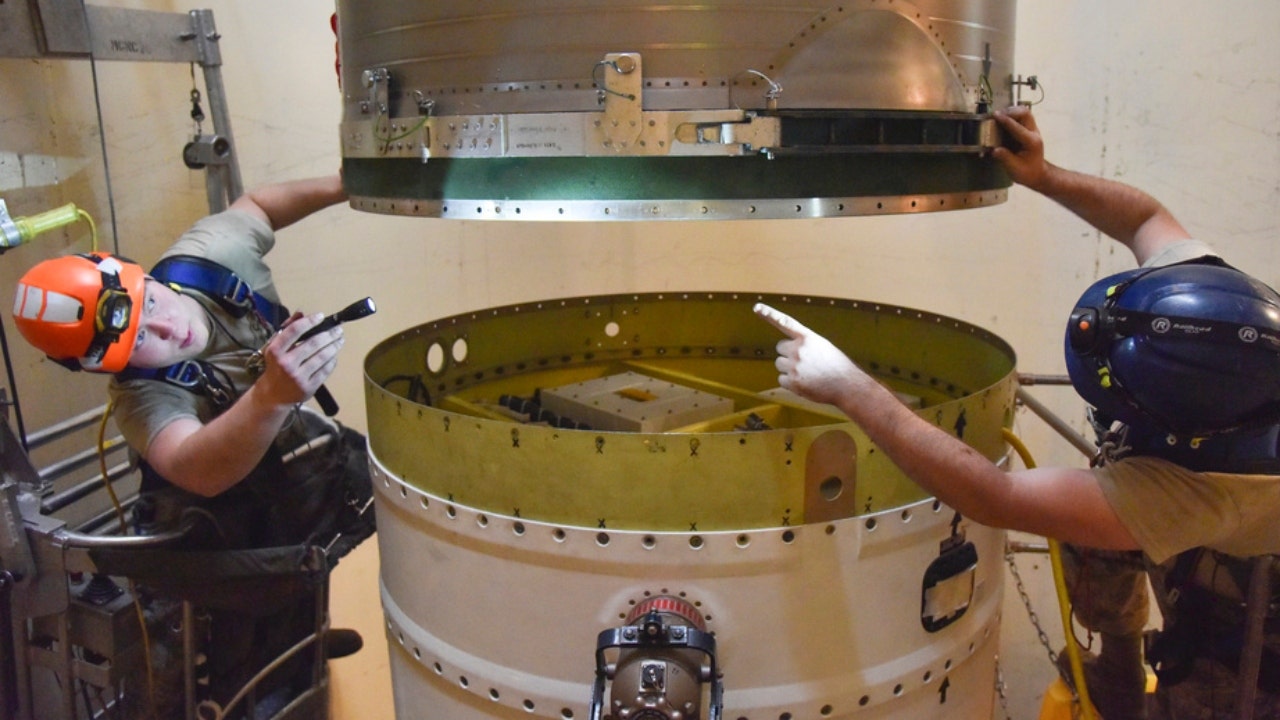Health
Air Force taking action to clean Montana nuclear missile sites after finding possible carcinogens

The Air Force Global Strike Command said Monday that it is taking “immediate measures” to clean up and mitigate polychlorinated biphenyls – probable human carcinogens, also known as PCBs – at two Montana locations following initial results from a recent study.
The major command said a team of bioenvironmental experts reported sampling results from Malmstrom Air Force Base in the state last Friday – the first from an extensive sampling of active U.S. intercontinental ballistic missile bases to address specific cancer concerns raised by missile community members.
“Based on the initial results from the survey team, which discovered PCB levels above the cleanup threshold designated by law in two of our facilities, I directed Twentieth Air Force to take immediate measures to begin the cleanup process for the affected facilities and mitigate exposure by our Airmen and Guardians to potentially hazardous conditions,” Gen. Thomas Bussiere, commander of Air Force Global Strike Command, said in a release. “These measures will stay in place until I am satisfied that we are providing our missile community with a safe and clean work environment.”
The U.S. Air Force School of Aerospace Medicine and the Defense Centers for Public Health conducted air and swipe testing for PCBs and other contaminants at Malmstrom AFB from June 22-29. All air samples from the Launch Control Centers and the Launch Control Support Building were non-detectable for PCBs.
AI-POWERED ARTILLERY COULD BRING DOWN COSTS, PRESERVE ENVIRONMENTAL DATA, EXPERT SAYS
Airman 1st Class Jackson Ligon, left, and Senior Airman Jonathan Marinaccio, 341st Missile Maintenance Squadron technicians connect a re-entry system to a spacer on an intercontinental ballistic missile during a Simulated Electronic Launch-Minuteman test Sept. 22, 2020, at a launch facility near Malmstrom Air Force Base in Great Falls, Montana. The Air Force has temporarily closed two nuclear launch facilities after finding unsafe levels of a likely carcinogen in air samples at a Montana missile base where a striking number of men and women who served have reported cancer diagnoses. (Senior Airman Daniel Brosam/U.S. Air Force via AP)
In addition, 300 surface swipe samples were taken across all Malmstrom AFB Launch Control Centers, with 279 returning non-detectable results.
Of the 21 with detectable results, 19 were below the mitigation level established by federal law and regulation.
The results are pending from samples taken a Wyoming’s F.E. Warren Air Force Base and North Dakota’s Minot Air Force Base, analyzing both air and surface tests.
Furthermore, results for completed ground and water samplings from all three bases are yet to be finalized.
Upon completion, the U.S. Air Force School of Aerospace Medicine and the Defense Centers for Public Health will be able to analyze the results to “guide a comprehensive and holistic response,” including future recommendations.

Runway at Minot Air Force Base, North Dakota. (HUM Images/Universal Images Group via Getty Images)
LUNG CANCER: TYPES, SYMPTOMS AND TREATMENT OPTIONS
The release of initial results is part of the Air Force School of Aerospace Medicine’s Missile Community Cancer Study.
The Air Force Global Strike Command noted that the intercontinental ballistic missile nuclear alert mission continues throughout the cleanup and mitigation.
“I am committed to remaining transparent during this process, and I pledge to continue an open dialogue with Airmen, Guardians, their families and all other stakeholders as the Missile Community Cancer Study continues,” Bussiere said.
PCBs were manufactured in the U.S. from 1929 through 1979, after which they were banned. The oily or waxy substance can persist for long periods in the environment.
The Associated Press reported that several men and women had reported cancer diagnoses at the Montana nuclear missile base, citing a briefing showing that at least nine current or former missileers were diagnosed with non-Hodgkin lymphoma.

Gen. Thomas Bussiere speaks at a press conference on June 23, 2020, in Vienna. (Thomas Kronsteiner/Getty Images)
The Air Force School of Aerospace Medicine launched the study to look at cancers among the entire missile community, checking for possible disease clusters.
While the school said it completed a review of Malmstrom cancer concerns in 2001 showing no increased rates of non-Hodgkin lymphoma among missileers, it acknowledged “time has passed,” and it has “the responsibility to investigate any potential service-related risks to Airmen, Guardians or their dependents’ health.”
The news agency said, based on data from a grassroots group of former missile launch officers and family members known as the Torchlight Initiative, that there could be a hundred more cancers of all types.
The Air Force Global Strike Command did not immediately respond to Fox News’ request for comment.
The Associated Press contributed to this report.

Health
Drinking alcohol is linked to six types of cancer, experts say: ‘It’s toxic’

It’s long been known that no amount of alcohol is good for the body — and now new research spotlights the potential harm it can cause.
More than 5% of all cancer cases are caused by drinking alcohol, according to the Cancer Progress Report 2024 from the American Association for Cancer Research (AACR).
Among the modifiable risk factors for cancer, alcohol is the third biggest, behind obesity (7.6% of cases) and cigarette smoking (19.3%).
TO REDUCE CANCER RISK, SKIP THE ALCOHOL, REPORT SUGGESTS
“Excessive levels of alcohol consumption increase the risk for six different types of cancer, including certain types of head and neck cancer, esophageal squamous cell carcinoma, and breast, colorectal, liver and stomach cancers,” said Rajarshi Sengupta, PhD, lead author of the AACR Cancer Progress Report 2024, in a statement sent to Fox News Digital.
More than 5% of all cancer cases are caused by drinking alcohol, according to the Cancer Progress Report 2024 from the American Association for Cancer Research. (iStock)
“Further, research shows that alcohol intake at an early age can increase the risk of cancer later in life.”
Based on these findings, limiting or eliminating alcohol can reduce the risk of developing alcohol-related cancers by 8% and the risk of all cancers by 4%, the report noted.
Addiction expert warns of risks
There has been a “roller coaster of information” about whether alcohol is harmful, according to addiction psychiatrist Dr. Adam Scioli of Caron Treatment Centers in Pennsylvania.
“There have even been reports for years that it could be beneficial for one’s health — but we know now that alcohol ingestion is one of the modifiable risk factors for cancer,” Scioli, who is not affiliated with AACR, told Fox News Digital.
‘DOES SMARTPHONE EXPOSURE CAUSE BRAIN CANCER?’: ASK A DOCTOR
Around 75,000 Americans each year are diagnosed with a cancer that is linked in some way to alcohol use, according to Scioli.
The more someone drinks — both in volume and frequency — the higher the risk, he warned.

Among the modifiable risk factors for cancer, alcohol is the third biggest, behind obesity (7.6% of cases) and cigarette smoking (19.3%). (iStock)
“Alcohol is a toxin,” Scioli said.
“We’ve long known that it impacts any number of organs, essentially starting with the brain and working its way down to the colorectal system.”
Is there a ‘safe’ amount?
Moderate alcohol use is defined as one drink or less in one day for women.
For men, it is two drinks or fewer per day, according to the Centers for Disease Control and Prevention (CDC).
“We’ve long known that alcohol impacts any number of organs, starting with the brain and working its way down to the colorectal system.”
“Drinking alcohol in moderation may increase your overall risks of death and chronic disease,” the agency stated on its website.
“Even low levels of alcohol use (less than one drink per day) can raise the risk of certain cancers.”
Scioli agreed, emphasizing that “we can definitely say there’s no added health benefit to ingestion of alcohol.”
“The line between safety and danger is debatable, and is different for each person.”
While risk factors like tobacco use are widely known, public awareness about the link between alcohol and cancer is still low, according to Sengupta.

Moderate alcohol use is defined as one drink or less in one day for women, and two drinks or fewer for men, per the CDC. (iStock)
Most Americans (51%) are not aware that alcohol increases cancer risk, per AACR data.
“It’s been flying under the radar for far too long — especially given the number of Americans who have met the criteria for alcohol use disorder, which is around 29 million Americans in 2023,” said Scioli.
What needs to change?
The good news, according to Scioli, is that with modifiable risk factors like alcohol, reducing the intake decreases the risk.
CLICK HERE TO SIGN UP FOR OUR HEALTH NEWSLETTER
As the report stated, those who are successful in decreasing their drinking or abstaining below those moderate risk levels will see a risk reduction in overall cancers, he noted.

Around 75,000 Americans each year are diagnosed with a cancer that is linked in some way to alcohol use, an expert said. (iStock)
“We need to do a much better job of making the public aware of the risks inherent in drinking — particularly moderate to heavy drinking,” Scioli said.
“And we need to make the public aware that there are mechanisms by which they can access help if they are unable to moderate their drinking or quit on their own.”
For more Health articles, visit www.foxnews.com/health
To help raise awareness, Sengupta of the AACR called for public messaging campaigns, “such as cancer-specific warning labels displayed on alcoholic beverages.”
Along with that, she told Fox News Digital, “effective clinical strategies that reduce or eliminate alcohol consumption must be considered to reduce the burden of alcohol-related cancers.”
Health
Intermittent Fasting + Walking: The Science-Backed Combo That Helped This Grandma Lose 3X the Weight

Sign Up
Create a free account to access exclusive content, play games, solve puzzles, test your pop-culture knowledge and receive special offers.
Already have an account? Login
Use left and right arrow keys to navigate between menu items.
Use escape to exit the menu.
Health
New schizophrenia drug gets FDA approval, taking novel approach to treating brain disorder

A new drug has been approved for the treatment of schizophrenia in adults.
On Thursday, the U.S. Food and Drug Administration (FDA) approved COBENFY (xanomeline and trospium chloride), an oral medication that is manufactured by Bristol Myers Squibb in New Jersey.
This marks the first new class of medications for the brain disorder in several decades, according to a press release.
5 MYTHS ABOUT SCHIZOPHRENIA, ACCORDING TO A MENTAL HEALTH EXPERT: ‘HUGE STIGMA’
COBENFY is expected to be available in the U.S. in late October, the company noted.
A new drug has been approved for the treatment of schizophrenia in adults. (iStock)
“Today’s landmark approval of our first-in-class treatment for schizophrenia marks an important milestone for the community, where after more than 30 years, there is now an entirely new pharmacological approach for schizophrenia — one that has the potential to change the treatment paradigm,” said Chris Boerner, PhD, board chair and chief executive officer at Bristol Myers Squibb, in the press release.
STUDY REVEALS HEAVY MARIJUANA USE IS LINKED TO SCHIZOPHRENIA
Schizophrenia is a serious mental illness that affects a person’s thoughts, feelings and behaviors.
It often causes hallucinations, delusions, disordered speech and loss of touch with reality, Mayo Clinic states on its website.

COBENFY (xanomeline and trospium chloride) is an oral medication that is manufactured by Bristol Myers Squibb in New Jersey. (Bristol Myers Squibb)
The disorder can also lead to lack of emotional expression, lack of motivation, cognitive dysfunction and social withdrawal.
Approximately 2.8 million people in the U.S. and 24 million people globally are living with schizophrenia.
AI-DISCOVERED DRUG SHOWS ‘ENORMOUS POTENTIAL’ TO TREAT SCHIZOPHRENIA: ‘REAL NEED FOR BETTER TREATMENT’
The disorder has traditionally been treated with antipsychotic medications, but around 40% of patients do not respond to treatments and 60% experience “inadequate improvement” in symptoms or “intolerable side effects,” studies have shown.

COBENFY is expected to be available in the U.S. in late October, the company noted. (Bristol Myers Squibb)
COBENFY works differently than the currently available schizophrenia medications.
“Due to its heterogeneous nature, schizophrenia is not a one-size-fits-all condition, and people often find themselves in a cycle of discontinuing and switching therapies,” said Rishi Kakar, MD, chief scientific officer and medical director at Segal Trials and investigator in the drug’s clinical trials, in the release.
“Schizophrenia is not a one-size-fits-all condition, and people often find themselves in a cycle of discontinuing and switching therapies.”
“The approval of COBENFY is a transformative moment in the treatment of schizophrenia because, historically, medicines approved to treat schizophrenia have relied on the same primary pathways in the brain.”
“By leveraging a novel pathway, COBENFY offers a new option to manage this challenging condition.”

“Today’s landmark approval of our first-in-class treatment for schizophrenia marks an important milestone for the community,” said Chris Boerner, PhD, board chair and chief executive officer at Bristol Myers Squibb. (iStock)
Sam Clark, founder and CEO at Terran Biosciences — a biotech company that develops treatments and technologies for neurological and psychiatric diseases in New York City — commented on the new approval in a statement sent to Fox News Digital.
“I am excited that the FDA has just approved [COBENFY] as a treatment for patients with schizophrenia, marking a big leap forward in the psychiatry space,” he said.
“These patients live with a difficult disease, and this drug with a novel mechanism of action will surely make a significant impact,” Clark continued.
“We look forward to seeing the renaissance continue as this approval paves the way for future breakthroughs and novel patient-focused therapeutics.”
CLICK HERE TO SIGN UP FOR OUR HEALTH NEWSLETTER
The approval follows three phases of clinical trials in which COBENFY was shown to result in a “statistically significant improvement in illness.”

Schizophrenia is a serious mental illness that affects a person’s thoughts, feelings and behaviors and often causes hallucinations and delusions. (iStock)
In terms of safety, the medication’s most common side effects during clinical trials were nausea, indigestion, vomiting, diarrhea, constipation, hypertension, abdominal pain, accelerated heart rate, dizziness and gastroesophageal reflux disease, the release stated.
Patients with certain existing medical conditions may experience other, more serious risks.
For more Health articles, visit www.foxnews.com/health
People should discuss potential complications with a doctor before starting the medication.
Fox News Digital reached out to Bristol Myers Squibb and the Schizophrenia & Psychosis Action Alliance requesting comment.
-

 News1 week ago
News1 week agoToplines: September 2024 Inquirer/Times/Siena Poll of Pennsylvania Registered Voters
-

 Business1 week ago
Business1 week agoVideo: Federal Reserve Cuts Interest Rates for the First Time in Four Years
-

 News7 days ago
News7 days agoVideo: Who Are the Black Swing Voters?
-

 Politics1 week ago
Politics1 week agoDem lawmakers push bill to restore funding to UN agency with alleged ties to Hamas: 'So necessary'
-

 Politics1 week ago
Politics1 week ago'I've never seen this': Top Republican details level of Secret Service 'lack of cooperation'
-

 News1 week ago
News1 week agoElection 2024 Polls: Florida
-

 World1 week ago
World1 week agoCritics slam landmark EU competitiveness report as 'one-sided'
-

 Finance1 week ago
Finance1 week agoThis ETF uses ChatGPT to invest like Warren Buffett
















